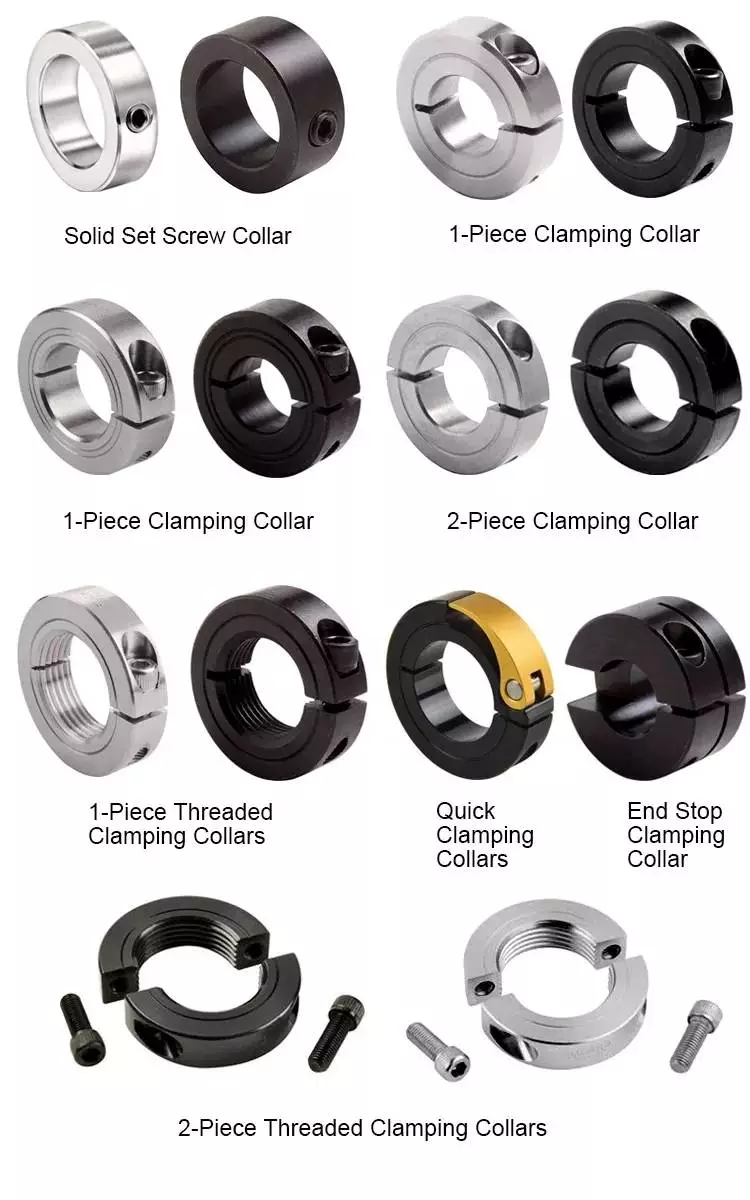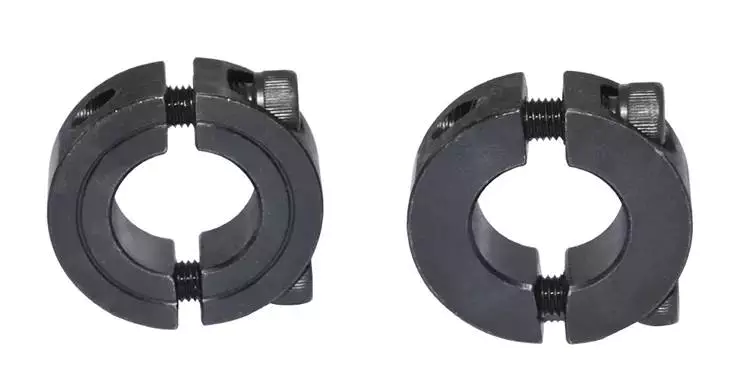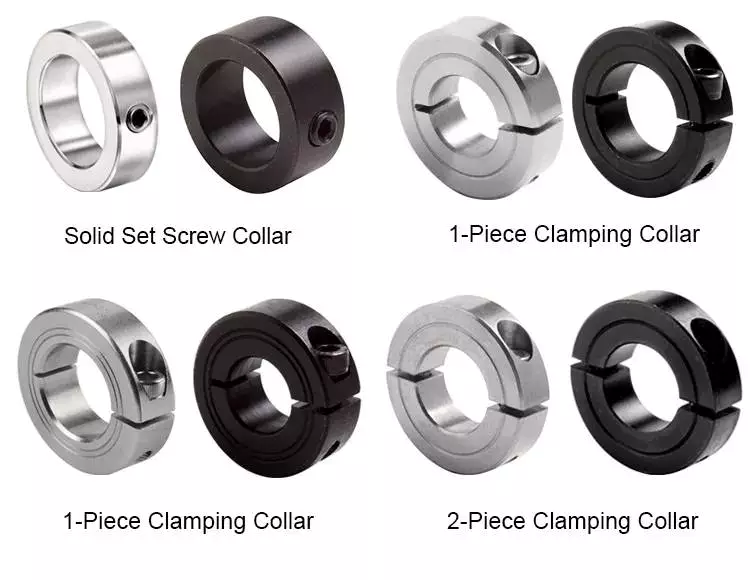
Can I purchase shaft collars with specific certifications for certain industries?
Yes, it is possible to purchase shaft collars with specific certifications for certain industries. Certifications ensure that the shaft collars meet specific standards, requirements, or regulations established for particular industries or applications. Here are some important points to consider when purchasing shaft collars with specific certifications:
- Industry-Specific Certifications: Different industries may have specific certifications or standards that shaft collars need to meet to ensure compliance with safety, performance, or regulatory requirements. For example, industries such as automotive, aerospace, food processing, medical, or oil and gas may require shaft collars that meet certifications such as ISO 9001 (quality management system), ISO 14001 (environmental management system), AS9100 (aerospace quality management system), or FDA (Food and Drug Administration) compliance. Identify the specific certifications relevant to your industry and application.
- Manufacturer Certifications: Some manufacturers specialize in producing shaft collars that are certified for specific industries or applications. They may have their own certifications or comply with industry-specific standards. When purchasing shaft collars, look for manufacturers who have the necessary certifications and a track record of producing compliant products. Their certifications should be prominently displayed on their website, product documentation, or available upon request.
- Product Documentation and Specifications: Shaft collar manufacturers often provide product documentation, specifications, or datasheets that outline the certifications and standards their products comply with. These documents may include information about industry-specific certifications, material certifications (such as RoHS compliance for restricted substances), or performance ratings. Review the product documentation carefully to ensure the shaft collars meet the necessary certifications for your industry or application.
- Supplier Verification: If you are purchasing shaft collars from a supplier or distributor, verify that they source their products from reputable manufacturers who adhere to industry-specific certifications. Request documentation or certifications from the supplier to confirm compliance. It is essential to ensure that the entire supply chain, from the manufacturer to the supplier, maintains the necessary certifications required for your industry.
- Consultation with Industry Experts: If you have specific certification requirements for your industry or application and are unsure about the available options, it is advisable to consult with industry experts or engineers specializing in that field. They can provide guidance on the certifications needed and recommend suitable shaft collar manufacturers or suppliers who can meet those requirements.
When purchasing shaft collars with specific certifications, it is important to verify the authenticity and validity of the certifications. Look for reputable manufacturers, suppliers, or distributors who have a proven track record of delivering certified products and maintaining compliance with industry standards. The certifications provide assurance that the shaft collars meet the necessary quality and safety standards for your industry or application.

Can I find information on using shaft collars for positioning and securing components?
Yes, you can find a wealth of information on using shaft collars for positioning and securing components. Shaft collars are versatile mechanical devices that are widely used in various industries and applications to provide precise positioning and secure fastening of components on shafts. Here are some sources where you can find valuable information on using shaft collars for positioning and securing components:
- Manufacturer Websites: Many shaft collar manufacturers provide detailed information on their websites about the applications, installation techniques, and benefits of using shaft collars for positioning and securing components. They often offer resources such as product catalogs, technical specifications, installation guides, and case studies that showcase real-world applications. Visiting manufacturer websites can provide valuable insights into the capabilities and best practices associated with shaft collar usage.
- Online Resources and Blogs: There are numerous online resources and blogs dedicated to mechanical engineering, industrial applications, and component usage. These platforms often feature articles, tutorials, and guides that specifically address the topic of using shaft collars for positioning and securing components. Websites of engineering associations, industry publications, and educational institutions can be excellent sources of information in this regard.
- Technical Forums and Discussion Boards: Online technical forums and discussion boards are vibrant communities where professionals and enthusiasts share their knowledge and experiences. Participating in these forums or browsing through relevant threads can provide valuable insights and practical tips on using shaft collars for positioning and securing components. Users often discuss specific applications, troubleshooting techniques, and innovative use cases, offering a rich source of information.
- Engineering Books and Publications: Engineering books and publications covering topics such as mechanical design, machine elements, or industrial automation often include sections or chapters dedicated to shaft collars and their applications. These resources provide in-depth explanations, theoretical foundations, and practical examples of using shaft collars for positioning and securing components. Libraries, online bookstores, and academic institutions are good places to access these resources.
- Professional Networking: Engaging with professionals in the field, such as mechanical engineers, designers, or maintenance technicians, can provide valuable insights into the practical aspects of using shaft collars for positioning and securing components. Participating in industry conferences, seminars, or workshops, or connecting with professionals through social media platforms like LinkedIn, can facilitate knowledge sharing and discussions on best practices and real-world applications.
By exploring these sources, you can acquire a comprehensive understanding of the principles, techniques, and considerations involved in using shaft collars for positioning and securing components. It is important to consult multiple sources and consider the specific requirements of your application to ensure the most effective and reliable use of shaft collars in your projects.

What is a shaft collar and its role in mechanical systems?
A shaft collar is a mechanical component used in various applications to provide support, positioning, and locking functions for rotating shafts. It is a cylindrical device that fits around a shaft and is typically secured in place using set screws or clamping mechanisms. The collar is designed to prevent axial movement of the shaft and maintain its position within a mechanical system. Here is a detailed explanation of the role and significance of shaft collars in mechanical systems:
Support and Positioning:
One of the primary roles of a shaft collar is to provide support and positioning for a shaft within a mechanical system. It acts as a physical barrier that prevents the shaft from moving along its axial direction. By securing the collar at a specific location along the shaft, it helps maintain the desired position of the shaft relative to other components, such as bearings, gears, or pulleys. This support and positioning function ensures proper alignment and operation of the system, preventing unwanted vibrations, misalignment, or excessive wear.
Axial Load Distribution:
Shaft collars also help distribute axial loads along the length of the shaft. When a mechanical system experiences axial forces or thrust, the collar can help transmit and distribute these forces to the supporting components, such as bearings or thrust washers. By evenly distributing the load, shaft collars help prevent localized stress concentrations and improve the overall load-bearing capacity of the system.
Limiting Radial Movement:
In addition to preventing axial movement, shaft collars can also limit radial movement of the shaft within a given range. The collar's design and tight fit around the shaft create a mechanical barrier that restricts radial play or shifting of the shaft. This is particularly important in applications where precise positioning or clearance control is required, such as in linear motion systems, conveyor systems, or machinery with rotating components.
Securing Components:
Shaft collars often serve as a means of securing other components onto the shaft. They can act as a stopping point or reference surface against which other elements, such as bearings, sprockets, gears, or pulleys, can be mounted. By securing these components with set screws or clamping mechanisms, shaft collars ensure their proper alignment and prevent unintentional movement or disengagement during operation.
Adjustability and Easy Installation:
Another advantage of shaft collars is their adjustability and ease of installation. They can be easily positioned and moved along the shaft without requiring complex tools or specialized equipment. This adjustability allows for fine-tuning of the shaft's position and alignment within the system. Additionally, the simplicity of their design and installation makes shaft collars a cost-effective solution for various mechanical applications.
Overall, shaft collars play a significant role in mechanical systems by providing support, positioning, load distribution, and component securing functions. Their presence helps ensure the stability, alignment, and efficient operation of rotating shafts in diverse applications across industries such as manufacturing, automation, robotics, and machinery.


editor by CX 2024-01-04